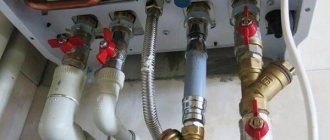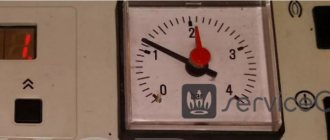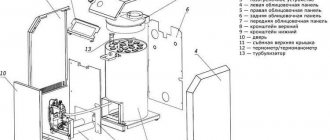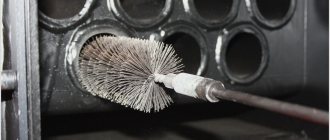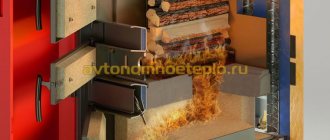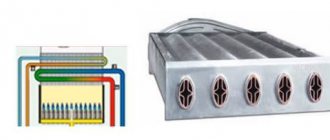Administration of Yemanzhelinsky urban settlement
- Boris Dubrovsky congratulated the residents of Varna on the 175th anniversary of the village 07/18/2018
- Boris Dubrovsky discussed with the investor the implementation of a special investment project to develop a gold deposit 07/17/2018
- In the Chelyabinsk region, the second stage of issuing land plots to large families in the village of Severny has begun 07/16/2018
- Lending volumes to small and medium-sized businesses in the Chelyabinsk region increased by a third 07/18/2018
- Construction of a bypass canal on Sak-Elge began in the Karabash district 07/18/2018
- Repair work was completed at the House of Culture in the village of Yemanzhelinka 07/18/2018
How gas boilers are maintained (video)
Gas heating devices require constant monitoring. It is necessary to evaluate not only the appearance of the elements, but also carry out certain checks of the quality operation of the system. Only companies that have certain certificates from the manufacturer can service boilers. Technical support will help maintain the functionality of the equipment.
- Author: admin
Rate this article:
- 5
- 4
- 3
- 2
- 1
(2 votes, average: 5 out of 5)
Share with your friends!
Routine inspection of gas equipment in the apartment
During the term of the contract, gas workers are required to carry out scheduled inspections of equipment and all connecting systems. The frequency of such inspections may be established by agreement. In this case, the consumer is given a corresponding act. In addition to such visits, they are obliged to respond as soon as possible and go to the owner’s address if he reports a detected malfunction. On-site inspection and work to eliminate it is carried out.
If gas appliances are used correctly, one check for the entire term of the agreement is sufficient. If the equipment’s service life has expired, gas workers recommend replacing it or carrying out diagnostics in a specialized organization. If the period is extended in conclusion, its service becomes annual.
Organizations servicing gas equipment prepare documentation for each room indicating all the devices located there, indicating the date of installation and service life.
Sequence of maintenance of gas boilers
Routine maintenance consists of cleaning, inspection and adjustment. Before work, turn off the gas supply. After which the system is given time to cool down. Next, the condition of the system is assessed by the appearance of the parts. The documentation and warranty seal are checked. Then attention is paid to all elements of the system. Next, they begin cleaning, having first cleaned the boiler.
Elements that need to be removed and cleaned:
- Support washer. Determines the location of the burner relative to the heat exchanger.
- Air sensor. Mixes air and gas.
- Flame detector. Lets you know when cravings are getting worse.
- Ignition electrodes. The mixture of oxygen and gas is ignited.
Any metal deteriorates when exposed to burning and soot. During normal burner operation, the flame is blue. A yellow tint indicates the need to clean the equipment.
The burner is cleaned using a special brush. In this case, the event should be carried out regularly.
Checking the automation is considered the most important part of the work, since life depends on the performance of the automation. The safety system includes a thermostat, gas valves and fittings, a controller, and a pressure switch. The main thing is to identify problems in time.
Read more about the functions of the gas alarm here:.
Gas workers force you to pay to check equipment
Every year, I receive a notice from the company that services the city’s gas supply to pay for an inspection of the gas equipment in the house. The inspection consists of the following: a specialist visit lasting a maximum of 5 minutes, a quick inspection of the heating boiler and stove. No service. The amount is suitable - about 700 rubles, growing every year. It also includes money to pay for calls to specialists in case of breakdowns or malfunctions of the gas boiler or stove. It is not specified how many calls are paid. But, if the equipment does not fail and specialists are not called, then the money is not returned. That is, 700 rubles for a five-minute visit. Moreover, if I refuse to sign the service contract, they threaten to cut off the gas. Is all this legal and is there any law against extortionists? Oleg Rzhev An authoritative expert on consumer rights protection, lawyer Dmitry Lesnyak answers: - Article 26 of the Law “On Gas Supply in the Russian Federation” organizations that own gas supply systems, gas suppliers or organizations authorized by them are prohibited from taking actions such as imposing contract terms on gas consumers that do not apply to the subject of the contracts (meaning the imposition of additional services in addition to the gas supply itself); inclusion in contracts of conditions that put one consumer in an unequal position compared to other consumers; violation of the pricing procedure established by regulatory enactments. Equipment inspection is carried out by a gas utility company at least once every six months and, since the obligation to carry it out is assigned to the gas supplier by Decree of the Government of the Russian Federation of July 21, 2008 No. 549 (see paragraphs 55-62), it should be carried out free of charge. As for subscriber servicing of your gas equipment, in general, concluding such an agreement is not prohibited by law, but the gas supplier has no right to impose maintenance (Article 16 of the Law “On Protection of Consumer Rights”). Thus, you can refuse to pay any additional payments other than the actual cost of gas consumed. As an example from judicial practice, I can cite the Resolution of the Federal Antimonopoly Service of the North Caucasus District dated August 3, 2011 in case No. A61-2265/2009. In accordance with it, the court considered that such actions of the gas supplier impose additional costs on the population to pay for services above state-regulated prices, which is unlawful and violates the rights of an unlimited number of citizens. To protect your rights, you should file a complaint with the territorial department of Rospotrebnadzor, as well as with the Federal Antimonopoly Service with a request to hold the organization accountable under Art. 14.6 Code of Administrative Offenses of the Russian Federation. You can ask your question to Dmitry Lesnyak here
You will also find a lot of useful tips on the official website of Dmitry Lesnyak
Who has benefits for paying for major repairs in apartment buildings?
KP readers are advised by Honorary Lawyer of Russia Leonid Olshansky
What to do if you get into an accident due to a sewer manhole
KP readers are advised by Honorary Lawyer of Russia Leonid Olshansky
What to do if the branches of a neighbor's tree are shading the dacha
KP readers are advised by Honorary Lawyer of Russia Leonid Olshansky
Is it possible to evict an ex-husband from a mortgaged apartment?
KP readers are advised by Honorary Lawyer of Russia Leonid Olshansky
How to correct errors in real estate documents
KP readers are advised by Honorary Lawyer of Russia Leonid Olshansky
Will they be punished for refusing to serve on a juror?
KP readers are advised by Honorary Lawyer of Russia Leonid Olshansky
Is it necessary to privatize the land under the garage?
KP readers are advised by Honorary Lawyer of Russia Leonid Olshansky
Is it possible to refuse to be understood and what are the consequences for this?
KP readers are advised by Honorary Lawyer of Russia Leonid Olshansky
Parents are divorcing - what rights does the father have if the court leaves the child to live with the mother?
KP readers are advised by Honorary Lawyer of Russia Leonid Olshansky
A policeman wants to search him in the middle of the street - how should he behave?
KP readers are advised by Honorary Lawyer of Russia Leonid Olshansky
Site age category 18+
Is it worth taking on the repairs yourself?
In a typical gas boiler, all structural elements are conventionally combined into three groups:
- burner;
- blocks that are responsible for safety;
- a heat exchange unit equipped with a fan, circulation pump, and many other elements.
During repairs, the main safety risk arises from possible gas leaks. The reason for this may be improper repair, dismantling or installation of equipment with fuel supply functions.
Because of this, it is better to have these structural parts repaired by a specialist. In addition, it is not allowed to independently troubleshoot faults in the electronic equipment of a gas boiler. The automatic system is quite specific, and unless you have the appropriate qualifications, it is impossible to correctly restore this type of equipment in practice.
And yet, if you do not have enough experience, it is better to entrust the maintenance of heating boilers and the repair of geysers to professionals.
What can you repair yourself?
All other elements can be repaired yourself, for example:
- The heat exchanger is washed manually (to do this, the unit is dismantled, after which it must be correctly put back in place). You can perform this work without dismantling - using pumps.
- Chimney cleaning will be needed in cases where there is a problem with draft (mechanical or chemical removal of blockages is carried out).
- Repair of the boost fan by lubricating its bearings with technical oil.
In fact, you can repair a gas boiler yourself only in cases where there are mechanical damages or blockages that can be easily identified visually (or by smell).
Other breakdowns are considered more serious, so they are repaired with the help of a specialist, and not with your own hands.
Types of gas equipment
Gas equipment can be divided into two categories: in-house and boiler.
- In-house gas equipment includes gas pipelines that supply gas from the gas distribution network, meters for gas consumption, as well as gas stoves, water heaters and boilers. This is what all people use in their homes and apartments for heating, heating water and cooking.
- Gas boiler equipment is used in rooms specially equipped for these purposes (boiler rooms). Such equipment includes gas pipelines, gas boilers, gas control units and gas control points. Boiler houses are used, as a rule, for heating large industrial premises (enterprises, schools, hospitals, kindergartens).
Types and designs
A gas boiler is a device designed to heat water by using the energy generated by the combustion of gaseous fuel. In this capacity, gas of natural origin is most often used - methane or propane-butane, but there are models that run on liquefied gas.
The geyser is used to heat water with gas.
The water supply system is connected to this device, resulting in the supply of hot water or heating of the room. First of all, gas devices differ in the installation method and are of wall and floor type.
The first type of device is compact and low-power . They have a high coefficient of efficiency (COP) and are mounted on brackets to the wall. Based on the type of combustion chamber, they are divided into open and closed. Floor-standing devices, depending on the operating principle of the burner, are available in two types: atmospheric and inflatable.
The latter type is often called replaceable, or ventilator . It has high efficiency and cost. Atmospheric burners are easier to restore when repairing heating gas boilers due to the simplicity of their design, and they are also quieter.
This video will tell you how to choose the right gas boiler:
Principle of operation
The principle of operation of gas heaters, regardless of the variety and design features, is almost the same. The automation equipment used in the equipment ensures high reliability and efficiency of their operation.
At the same time they happen:
- single-circuit;
- double-circuit.
The former are used only for space heating, while the latter also provide hot water supply. During operation of the device, gas is mixed with air, forming a mixture that is subsequently ignited. The fire and the resulting combustion products heat the coolant - cold water coming from the plumbing system. After which the heated coolant, due to the created pressure, begins to flow into the circuit intended for it.
Automatic equipment makes the column safe and reliable
The design differences of a single-circuit boiler are that, unlike a double-circuit boiler, it does not have a heat exchanger. If there is a need for hot water supply, an additional coolant tank is installed. This container is nothing more than an indirect heating boiler.
A boiler with two circuits works a little differently. It uses a heat exchanger to supply heated media to the heating system. The water in it heats up to a temperature of +80ºС. As soon as the temperature in the heated object changes, the heating mode is switched on. The changes are monitored by a sensor that sends signals to the thermostat.
It is the latter that transmits the command to the controller, which, in turn, starts the pump and ignites the burner through a relay. At the same time, the boiler electronics control the heating of water and, when the desired value is reached, turns off its heating by reducing the gas supply or stopping it.
As soon as the temperature drops again, the temperature sensor again sends a signal, which leads to a greater opening of the fuel valve and ignition of the burner. The heated water, passing through the circuit, returns through the return line to the boiler. To prevent it from mixing with the second circuit, a three-way valve is used.
Since the water in the heat exchanger flows in a circle, then, unlike the hot water supply (DHW) circuit, it practically does not contain any mixture or impurities. Therefore, when repairing and servicing gas boilers, attention is first paid to the condition of the DHW circuit.
Essential elements
At its core, a gas boiler is a mini-boiler room with its own protection, control elements, pump and other parts. One of its important blocks is the smoke removal unit. Depending on the combustion chamber, it can be open or closed.
The open-type chamber is designed in such a way that all combustion products generated are removed from the room using a chimney. Combustion is supported by air coming from the surrounding space, so it is important to ensure a constant flow. If the chamber is closed, then forced ventilation is used to remove emissions. A fan is built into the design, which draws out and throws combustion products into the smoke channel.
When the chamber is closed, forced ventilation is used
The main elements of the boiler include:
- Gas burner. Its task is to mix fuel with air and then transfer the resulting mixture to the nozzles. Its main element is nozzles, which are responsible for uniform distribution of gas and ensure uniform heating.
- Heat exchanger. This is a device that divides the system into two parts. In its manufacture, plates are used, stamped in such a way that the heat transfer area is increased. The plates are installed on a base in which there are pipes for supplying and dispensing water.
- Circulation pump. Not used on all models. You cannot do without it if the pressure in the supply circuit is low. It provides forced circulation and creates the required pressure.
- Expansion tank. Used as a protection element. In case of excess liquid arising from thermal expansion, its excess flows into it.
- Control block. Responsible for all operating modes, from water supply to activation of protection in the event of emergency situations. This is a very important unit, the repair of which is carried out followed by testing at a special stand.
- Self-diagnosis unit. Using this unit, you can carry out initial diagnostics of the device and identify possible breakdowns. Most often, when problems occur, a code corresponding to a particular error is displayed on the device screen.
In addition, device protection is an important element. It automatically closes the solenoid valve when the gas supply stops. It also includes sensors that detect overheating, weakening of traction, and gas leaks.
Is a license required or not?
Any gas equipment has a high hazard class; you must work with it carefully and professionally. It is no coincidence that it is recommended to carry out maintenance of gas equipment at least once a year
Only specialists should carry out such activities.
And the installation of new gas equipment must be unconditionally trusted to professionals. As for the license for such services, according to Federal Law No. 99-FZ “On Licensing of Certain Types of Activities”, a license for gas work is not required.
But in order to carry out activities related to the maintenance and installation of gas equipment, you need to become a member of the Self-Regulatory Organization and obtain permission from it to perform such services.
Only specialists with higher education can obtain permission from the SRO. To obtain admission, you must provide the required package of documents to the Self-Regulatory Organization. You will also have to pay annual membership fees.
Why does a heat generator need maintenance?
When purchasing a boiler for operation in closed heating systems, we all most often think exclusively about its rational use and the advantages of the chosen model. Most homeowners continue to use this equipment for ten years, until suddenly, in the middle of the heating season, the boiler unit became unable to properly heat the room.
And the reason for this may be ordinary corrosion of the heat exchanger: for many years without maintenance, scale has formed in the heat exchanger coil, which has led to a gradual decrease in efficiency. The boiler power at normal settings became insufficient, which resulted in an increase in the coolant temperature and, as a consequence, gas consumption. A simple procedure for flushing the heat exchanger of a gas boiler during maintenance solves this problem even at the stage of scale formation. And this is not the worst scenario of what can happen to a boiler without maintenance.
Let us remember that a gas boiler is a set of equipment that uses gas and electricity to operate. In the event of a malfunction of the electrical system or gas pipeline, not only the property and inhabitants of the apartment in which the equipment is installed are in danger, but also the residents of the entire apartment building. Regular inspection and maintenance will allow a specialist to identify only emerging problems at an early stage, without bringing them to the point where the operation of the equipment poses a threat to life and health.
The quality of operation of the heat generator determines gas consumption, as well as the comfort and safety of your household.
Low gas pressure
The gas pressure in the gas main varies significantly depending on the time of year. In winter, when the maximum number of consumers is turned on, gas pressure often approaches the minimum permissible. Old-style domestic equipment may completely shut down in such situations due to low pressure.
Modern boilers still function, but they can no longer produce their full power. This is not as noticeable when heating the heating system as when the boiler is operating to heat hot water, when consumers notice that the water coming from the tap is lukewarm. Only a service engineer who has a special knowledge of the equipment. And if the static pressure is 130 mm. vd. Art. at the inlet to the gas valve, then we can immediately assume that there will not be enough gas in the dynamics, and the boiler will not produce its full power if necessary. With a further decrease in pressure, the power of the equipment will also decrease.
This value can be determined from a graph of the dependence of thermal power on gas pressure at the burner, provided by the equipment manufacturer. They are considered the most resistant to a decrease in gas pressure. In the event of a drop in blue fuel pressure, the service engineer is unable to influence the situation and must contact the gas utility.
We recommend: Stove for the garage: how to make a stove with your own hands, homemade designs for long-term burning using waste and wood
Cleaning the gas burner chamber and heat exchanger
gas boiler burner
After removing the cover, clean the outer fins of the heat exchanger from combustion products with a coarse brush. A well-cleaned heat exchanger ensures uniform heating of water or other coolant and prevents local overheating.
Using a soft copper brush, you need to remove any remaining soot from the ignition electrodes and ionization sensor, which are located in the chamber, and wipe them with isopropyl alcohol. Finally, you need to check the gap from the electrode to the burner, which should be about 4 mm.
Chemical descaling
gas boiler heat exchanger
There are operating conditions (they are indicated at the end of the article) under which it may be necessary to service a gas boiler in the form of cleaning the heat exchanger from scale. In this case, the supply pipes are unscrewed and the entire heat exchanger is dismantled. For chemical cleaning, it must be filled with a solution of hydrochloric acid, which dissolves blockages. After 10-15 minutes, drain and rinse with running water. If during washing there are still difficulties with the passage of water, the cleaning process should be repeated.
Methods for self-diagnosis of faults
Often the user is in a situation where he is not sure what exactly is broken in the gas boiler. In such cases, there is no need to rush to remove and repair anything. It's risky and dangerous. Before work, you should diagnose the equipment and identify the exact causes of malfunctions.
Modern gas boilers are equipped with various sensors that reflect a number of important functional indicators of the unit. They monitor changes in temperature, pressure and other parameters. In the event of a malfunction, modern boiler models provide automatic shutdown of the device.
The source of the breakdown is identified by the consequences it causes. For example, you can visually see fumes, leaks, and sparks. You can smell a gas leak or short circuit by smell. From the changed sound of the gas boiler, it becomes clear that the unit has malfunctioned.
The instructions included with the purchase of the device describe the most common faults in the boiler model being purchased and how to detect, diagnose, and eliminate them. It also indicates what a specific error code and blinking lights on the dashboard mean.
So the light can blink in different modes: fast or slow. Or burn constantly. The color of the light bulb can be red, green or yellow.
The manufacturer's instructions indicate all possible error codes that may appear on the display. It also explains how to troubleshoot the problem.
You should not throw away the instructions from the device, as they may be useful to the gas technician you called to fix the problem. It indicates the characteristic features of the gas boiler model, the dimensions and location of components and parts.
Service life
The service life of gas equipment is determined in the technical passport of the boiler and ranges from 10 to 15 years. However, with regular maintenance and prevention, it can last much longer. The regulatory services may establish additional requirements for service life.
This may be due to the presence (or absence) of spare parts that are needed in the process of maintaining full operation of the boiler. If during the repair some part is required, and the manufacturer has stopped producing them, it may be necessary to replace the boiler as a whole with a more modern one and one equipped with spare parts.
We recommend: How to set up a pellet boiler?


